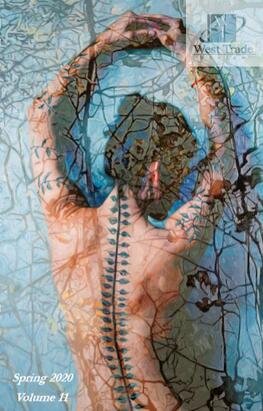We draw out what’s wondrous
Good to Know
Submissions: April 1 – August 1
August 15 – December 15
Website: www.westtradereview.com
Twitter:@WTRlitmag
Instagram: @westtradereview
Facebook: @WestTradeReview
How much of what you publish is solicited and how much comes from general submissions?
Almost all of what we publish is from general submissions. There’s only one exception: Each edition, we feature an interview with a writer and publish a sampling of their work along with that interview.
Do you read your submissions blind? Why or why not?
We publish a mix of published and emerging writers, a number of which have never been published before. We make final publication decisions based on the quality of the work, not who the writer happens to be or what their prior publications are.
What’s your advice for writers about working with an editor?
Approach the editorial process with a spirit of collaboration, and a willingness to listen. Most of the time, our editors see what’s exceptional and wonderful in a story. Our goal with edits (whether they’re structural, or involve shifting or tightening focus—or even cutting a character or scene) is to make sure that we draw out what’s wondrous in a story, and edit out anything that detracts from the wonder.
What’s your advice for writing a cover letter and a bio?
Always be direct and concise with both. We don’t need a list of everything you’ve published over your entire lifetime. Give us a sampling of your most recent publications and/or the ones you feel are most significant. Feel free to include web addresses and social media handles, and make sure your bio is written in third person, please.
Err on the side of professionalism—a brief sentence adding some personal color is great, but beyond that, simply stick to publications/education/etc.
POETRY EDITORS: What advice do you have for poets about putting together a submission with multiple poems?
Always place what you consider your stronger poems first within the grouping. Quite often, especially during crunch time, we read the first poem or two much closer. If those don’t make a strong impression, we may quickly skim the remainder of the poems.
Fiction Editors: What advice do you have for writers about the beginning of their pieces?
Avoid “throat clearing”—the tendency writers have to take too long establishing character, setting, time, and relationships before something interesting happens. As readers, we don’t need much information to participate in a story. Start with conflict, with a disruption, and we’ll fill in the blanks about the details (who the character is, where they are, etc.). Conflict gives us a reason to care about the character, and if we have that, we’re more than willing to go along on the journey with you and discover everything there is to discover in your story.
The best advice I’ve heard regarding the beginning of short stories is that, from the very first word, a short story should be driving directly toward the heart of its reason for being. There is no space in short fiction to meander, as there is in the novel. No one piece of advice, or ‘rule’, for writing is universally applicable, but I feel that taking a straight line to the essence of a story is a safe principle to live by.

